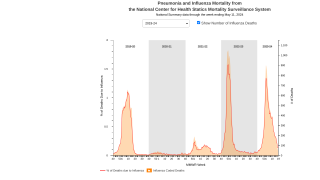FDA’s Dr. Gottlieb Is Getting a Flu Shot This Week

The Food and Drug Administration (FDA) says this week marks the official start of 2018-2019 “flu season.”
The FDA, along with its partners across the Department of Health and Human Services, has been working throughout the year to prepare the development of a safe, effective flu vaccine for the season.
“I’ll be getting my flu shot this week at an event in Washington, along with the U.S. Surgeon General Jerome M. Adams,” said FDA Commissioner Scott Gottlieb, M.D.
“With the severity of last year’s flu season, I know that there are questions about the effectiveness and benefits of the flu vaccine.”
Since the 2017-2018 flu vaccination effectiveness (VE) was reported to be just 36 percent effective, everyone is hoping for better results for the 2018-2019 season.
“I want to take this opportunity to update you on what we’ve learned from last season, the steps we’re taking to improve our readiness and the effectiveness of this coming year’s flu vaccine, and the continued importance of getting vaccinated,” said Dr. Gottlieb.
“While the effectiveness of the vaccine may vary year to year, I want to assure you that evidence remains strong to support the benefits of the annual flu vaccine for most people.”
“Because there’s often more than one type of influenza virus circulating each season, influenza vaccines are designed to target 3 or 4 of the influenza viruses that are most likely to circulate during the season:
- two influenza A types (H1N1 and H3N2),
- one (trivalent formulation), or
- two (quadrivalent formulation) types of influenza B.
“One of the challenges in fighting flu is that the viruses can change their genetic make-up rapidly -- not only between flu seasons but also during the course of a single season.”
“As a result, the seasonal influenza vaccine needs to be evaluated annually to see whether its composition needs to be adjusted.”
To select the influenza virus strains for inclusion in each season’s flu vaccine, the FDA, World Health Organization (WHO), the Centers for Disease Control and Prevention (CDC) and other partners review data collected on the circulating strains of influenza from around the world to identify those strains that are most likely to cause the most illness during the U.S. flu season.
Since it generally takes several months for influenza vaccines to be produced, flu strains for the next season need to be selected months in advance to ensure we’re prepared with enough supply when flu season hits.
The FDA advisory committee met in March 2018 to select the strains for this upcoming season.
Last year’s flu vaccine was less protective than it had been in many previous years. In part, because the vaccine was not as effective against one of the predominant circulating strains of influenza.
This isn’t the first time that the vaccine strains have deviated in some important ways from the influenza strain that ends up circulating during the flu season.
But we’ve learned a lot of lessons from these highly unfortunate incidents. And we’ve improved our scientific methods to reduce the odds that it happens again.
We’ll keep working with our partners to develop vaccines that are more protective against flu.
We have some confidence, based on the pattern of influenza circulating now in the Southern hemisphere, that the flu strains chosen for this year’s U.S. seasonal flu vaccine should offer Americans good protection.
A seasonal flu vaccine is one of the most effective and safest ways to protect yourself, your family and your community from the flu and serious flu-related complications, which can result in hospitalizations.
It’s important to note that even when the vaccine does not fully prevent someone from contracting flu, it may lessen its severity.
While the majority of vaccine doses are made using chicken eggs, some doses are made in mammalian cells or by recombinant DNA technology. The latter two are some of the newer technologies.
We found that a preliminary analysis of Centers for Medicare and Medicaid Services data indicates that for the 2017-2018 flu season, the cell-based influenza vaccine appeared to have somewhat better effectiveness in preventing influenza than the egg-based vaccine.
However, this is just one theory. More data is needed to better understand these preliminary findings.
As we prepare for the flu season, I want to assure you that efforts for the 2018-2019 flu vaccine are well underway. The FDA has already evaluated and released many vaccine lots and influenza vaccine is available now from healthcare providers.
Providers are starting to administer these vaccines.
“I encourage you to speak to your healthcare provider about steps that you and your family can take to protect against the flu, including an annual flu shot,” said Dr. Gottlieb.
Our Trust Standards: Medical Advisory Committee
- Statement by FDA Commissioner Scott Gottlieb, M.D., on preparations for the upcoming flu season and vaccinations
- Southern Hemisphere Influenza Season Ending
- Flu-Related Deaths Reach 80K During 2017-18
- Influenza Vaccination Recommendation Clarified for Pregnant Women
- 500 Million Easter Eggs Could Be Saved by the FDA

























